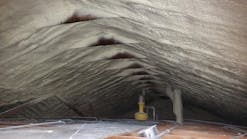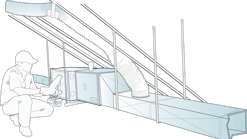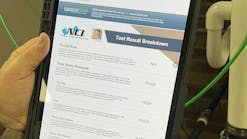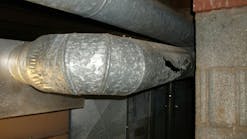A major benefit of purchasing a solar hot water heating system is that it's believed to be worry and maintenance free. That's a popular belief, but can we really "set it and forget it?"
I've spent the last four years working in the solar industry training sales teams and companies to sell solar systems. I started my business life in the heating-air conditioning industry, and have spent over a decade training HVAC dealers and manufacturers. One of the most important things we can learn from the HVAC industry is how to perform equipment maintenance.
To Maintain or Not to Maintain
Maintenance helps a system run longer, and operate more efficiently. Those concepts are just as big of an issue with solar, as with regular HVAC equipment. Due to the fact that we have very few moving parts, maintenance of solar equipment may not extend running time. Or will it? We have a unique problem with solar thermal systems in that we can’t easily tell whether they're working or not.
Most systems have the grid or the gas company as a back-up. So, if a solar equipment system isn't performing as specified, the back-up system will kick in, and we never even realize that there's a problem. Many systems have pumps that, if not operating properly, will shut down the solar hot water production. The system will not let you run out of hot water; it merely switches back to the back-up utility.
Catching Small Problems Early
Performing maintenance on a solar hot water heating system is good for both the consumer and the installing contractor. The consumer will get assurance that the system is working the way it was designed and is delivering the hot water they were promised.
Small problems can be detected early with proper maintenance. Things like corrosion, which causes leaks can be detected early. Penetrations through the roof can be inspected to be sure that there aren't any pinhole leaks that can quickly get worse. Small leaks can cause big problems. They can weep for months, maybe even years, soaking insulation, yet not enough to leak through into the ceiling down below. That water sitting in the attic can be a breeding ground for bacteria and mold, along with other problems.
Maintenance Benefits
On the contractor side of the equation, a maintenance program will provide us with some real benefits for our company as well. First of all, we get to see the customer again and offer new products or services. Since we now have some tax credits available, items such as solar powered roof fans should be offered to customers. In the past few years, solar hot water monitoring systems have come into the market. With some systems available today, we can see what the customer'’s solar equipment system is producing right from our computer.
Another great benefit is the fact that we're getting paid to visit with the customer again, and offer them value in addition to the original installation. Also, we can be sure the system is producing as it was designed. This feature can be done at anytime. It can be fill-in work, to be done when we want, leveling out our workload.
Finally, this is a way to glue that customer to you. The person who has paid in advance for your company to come back and do complete maintenance on their system will not go anywhere else; you have a customer for life. Yes, I'm suggesting you set up a maintenance plan on a pre-paid basis. Many contractors today do one year, two year, and even three years agreements. Some companies do a credit card charge monthly, with no expiration date. It's a perpetual maintenance agreement, cancellable by either party with proper notice.
The HVAC industry has believed in the concept of maintenance agreements for decades, and it's popular in the appliance world as well. Multi-year agreements are popular. The consumer today understands the need to protect the considerable investment represented by a solar hot water system. We as heating professionals are the right group to offer them a complete package, installation, and required maintenance. It's good for the customer, and for the contractor.
Jim Hinshaw spent 20 years in the heating/air conditioning/plumbing industry prior to starting his training and consulting business, Sales Improvement Professionals, Inc. He worked with solar contractors for the last 4 years, and is a partner in the Solar Roundtable, a forum for all things solar. The Solar Roundtable has a maintenance agreement that’s been developed for the solar industry. He can be contacted at www.siptraining.com, [email protected], Phone:602-369-8097.
Maintenance Check List
So just what should we check on a maintenance inspection for a solar hot water-heating system? Rather than put out a list that some may think is too long, or not long enough, I have examples from several manufacturers: Schuco, Viessmann, and Heliodyne. Here are common areas for maintenance.Monthly:
- Check pressure gage on storage tank to be sure there's proper pressure
- Check for visible leaks
- Check to be sure there's fluid flowing through flow meter
- Check controls for error codes/prompts
Annually:
- Keep collectors clean. Simple cleaning is vital to proper performance.
- Check the integrity of the roof mounting hardware. Here 's where small problems can become disasters if not caught in time.
- Check the thermal insulation of the piping to be sure there's integrity
- Check collector glazing and seals. Look for cracks in glazing, check to be sure seals are in good condition. Plastic glazing, if excessively yellowed, may need to be replaced.
- Check for shading. Trees will grow and shade that wasn't a factor when the system was installed may be affecting system performance in later years.
- Check the roof penetrations. Flashing and sealant around the roof penetrations should be in good condition, with no cracks or visible chips.
- Pumps should be checked for proper operation. Loud operation or squealing could mean air is in the system, follow the guidelines for re-pressurization.
- Some suggest a six-month inspection after installation to check the following: operating pressure, smooth pump operation, supply temperatures, control functions
- Check the PH of the glycol heat transfer medium annually. It should be in the range of 8-10. If it falls below 7.5, or is discolored, it must be changed.
- Some systems have anode rods in the tanks, they should be checked every 2-3 years.
- Check all valves for proper operation.
- Bleed the system using the air valve on the air separator.
- Every 2-3 years, check/remove calcium from solar storage tank as required.
Note: the monthly checks can be done by a homeowner. Annual inspections should be done by a qualified professional.








